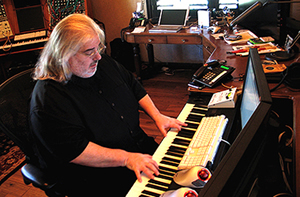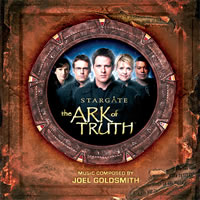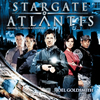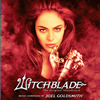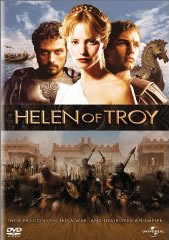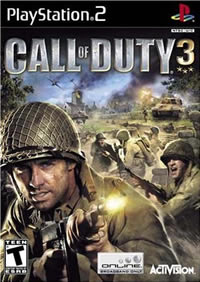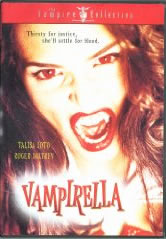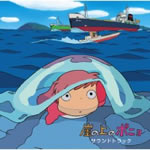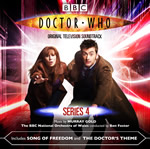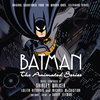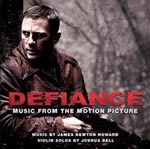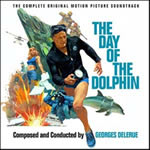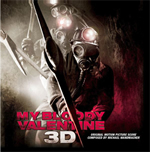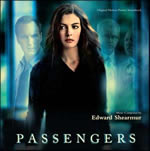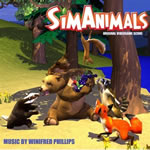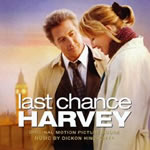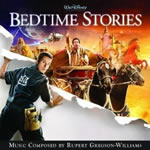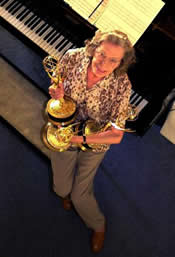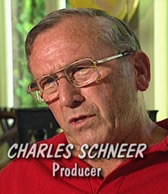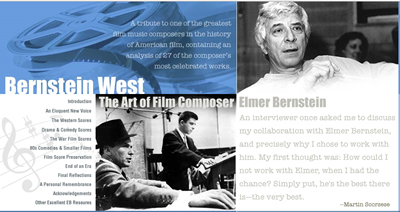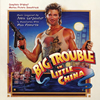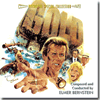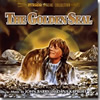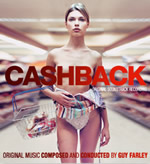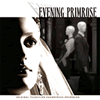 |
Soundtrax: Episode 2009-01
January 28, 2009
By Randall D. LarsonThis column is dedicated to the memory of Forest J Ackerman, who died last December. The original fan’s fan, in many ways Forry was the only one for a long time keeping the spirit of Karloff and Lugosi and O’Brien in the public eye. I was pleased to have an issue of Famous Monsters of Filmland dedicated to me and my colleague Greg Shoemaker many years ago, in acknowledgement of our efforts in putting together some behind the scenes information on Toho monster movies. While Famous Monsters was eventually overcome by the more serious and in-depth reporting of Cinefantastique, Fangoria, and others, Forry’s graceful devotion to science fiction, horror, and fantasy in literature, cinema, and music was always treasured and was always an inspiration. - rdl
Through the Stargate with Joel Goldsmith
Joel Goldsmith Joel Goldsmith continues to forge his own way as a credible and significant composer of film and television music, well out from under his father’s shadow. His efforts over the last ten years on the Stargate SG-1 television show and its subsequent variations have been substantial and constantly interesting (soundtracks issued on GNP Crescendo, Varese Sarabande, and Joel’s new label, Freeclyde) as his work on more than four dozen feature and television films. I spoke to Joel about his recent work, how the Stargate series developed through its four distinct series, and about his new CD label, which is making some of his lesser known music available on cd.
Q: How has the music for the various Stargate series developed over the last ten years since the first series began?
Joel Goldsmith: Originally the underscore was heavily based on David [Arnold]’s original themes from the Stargate movie. As SG-1 developed and I composed themes for the different characters, I became less reliant on David’s original themes for the film as I compiled a library of my own. In addition, the producers wanted to move away from David’s original themes. As the series progressed, obviously, the music became more stylized. Then when Atlantis came, that added a number of new themes as well, and I didn’t have to rely on David’s at all. I had all new themes for Atlantis.
Q: The series became its own entity, coming into its own mythology apart from the film that was its genesis…
Joel Goldsmith: I think so. But I’ll still come back to that original SG-1 theme from time to time. There’s something warm and fuzzy when you hear it, because it brings you back to the foundation of the entire series.
Q: In Ark Of Truth you’re facilitating a very orchestral-based score with sweeping symphonic melodies.
Joel Goldsmith: Yes, I did, though I didn’t use much of David’s original themes, except for the Main Title, of course. There were a few statements used in the film, but mostly everything else was new themes or themes from the series. But stylistically it was very much in that exotic, epic, high-adventure feeling that David wonderfully established in the original film.
Q: How would you contrast the musical differences between Continuum, Ark Of Truth, and Atlantis, or are you trying to maintain a musical consistency between each Stargate show?
Joel Goldsmith: When we first started Atlantis, [creators] Brad [Wright] and Rob [Cooper] and I discussed it, and we didn’t want to reinvent the music. We decided to stay with the same approach towards scoring. There have been specific episodes where went in a different direction, but predominantly we’ve stayed pretty consistent with the traditional orchestral approach.
Q: How have your experiences on the movies allowed you to develop the music in the body of a complete film rather than in one of the shorter episodes?
Joel Goldsmith: I was given more time. You get more time for the film and you get to use a live orchestra instead of just orchestral samples. Having the luxury of an orchestra expands what you can do, and it also expands the impact of the music itself. When you use electronics – which can be very convincing these days – you’re still dealing with one performer. When you have the luxury of an orchestra, you’re dealing with 50, 60, or 70 individual artists, and many if not most of them are virtuosos. When you take all that talent and ability, it makes it much more spectacular. You know, one time early on, I told my father how I was stressing out about an orchestra score, wondering whether it was going to sound good or not. He told me, “The bottom line is, you can have the orchestra play Twinkle Twinkle Little Star and it’s going to sound amazing!” And to a large extent, he’s right. It’s a lot harder to write for 20 players than it is for 60. With 60 players, just about anything is going to sound good and impressive. 20 players, 15 players, 10 players, like they were doing in early television, that’s hard!
Q: On Stargate, how have you accentuated the science fiction and fantasy elements in your music? Or have you concentrated more on the human element?
Joel Goldsmith: I think that generally I always go for the human emotions. You’re going to relate more to the audience in that way. The electronics often accompany the sci-fi or high-tech things, as cliché as it sounds. I will often use electronics for something technical, and I’ll also use it for ethereal fantasy. But generally, the approach is emotion and theme. Every show I try to write a new theme that relate to the characters of that episode.
Q: Stargate is more about characters and what they’re going through than the environment they happen to be in. You’ve got all these sci-fi, futuristic things, but the heart of it remains a human drama.
Joel Goldsmith: I think so. I think some of our best shows have been shows that didn’t necessarily have to be a science fiction show. They are set in that environment and are encapsulated in that world, but the stories tend to be more timeless, human stories that the audience is going to relate with and be moved by. Fascinating or intriguing the audience only goes so far; at some point the audience has to relate and has to be moved and emotionally attached, and I think that’s one of the reasons the Stargate series has been so successful, because it touches people.
Q: Generally, what size of ensembles are you able to use?
Joel Goldsmith: On the Stargate series, it’s all electronics sweetened with three or four live musicians and sometimes none. On the films we used about 60 players.
Q: What’s been most challenging for you on the Stargate universe?
Joel Goldsmith: The week-in and week-out grind. It can be daunting, sitting down when you’ve just finished a show and have to spot a new one the next day, and that show has 27 minutes of music and we’ll have to mix it in a week, it can be a daunting task. Thankfully Neal [Acree] and Rick Chadock are there to help. But it’s just having the discipline to sit and write a theme – there is no time for pondering. It’s really about sitting down and writing.
Q: Now, as the show has been going on for so long, does it get any easier because you have ten years worth of music to draw from, or is it still challenging to come up with new music for a new episode now as it was when you started?
Joel Goldsmith: There’s no question that it’s definitely a luxury to have a library of themes to go back on. We do track a certain amount of shows every year. My music editor, Rick Chadock, takes the existing library and edits the music in. Shows that are really that thematically-based are generally tracked. The shows that I score are the shows that need kind of a fresh approach, in one way or another.
Q: Does Rick decide which ones those are or do you work that out together?
Joel Goldsmith: I decide which shows will be tracked. I’ll discuss it with Rick. He’s got to look at it and decide whether it’s trackable, because he has a vast knowledge of the library. It’s a huge library, and he’s intimately familiar with it. Sometimes on tracked shows we end up having to write a couple of cues anyway, just to fill in the gaps.
Q: Now, while you’ve been the mainstay of Stargate’s music over its duration so far, you’ve also had assistance. You already mentioned Neal Acree, and Kevin’s Kiner’s written some music, and early on Richard Band and Dennis McCarthy had a hand. What have their contributions involved?
Joel Goldsmith: Kevin and Richard were back in the first two seasons of SG-1. Since then it’s been me. Ricky came back and helped me on a couple of episodes, and Neal’s been helping me. Neal’s invaluable, with the amount of music and what we’re doing, it would be nearly impossible to do it on my own.
Q: Your score for Witchblade is a wholly different type of a score, a grittier and much more contemporary or urban-based score. How did you arrive at the approach for that show?
Joel Goldsmith: At the time, not very much TV had been done like that at all. When Ralph Hemecker, who was the executive producer and show runner, tracked some early stuff, he was using a lot of Moby and Crystal Method and a lot of stuff like that. And Ralph is very, very touchy about any kind of sentimental music, his radar is up for that. Sometimes I’ve had to fight him on that. There was a scene in the very first episode were Sara Pezzini was in her apartment just doing her daily chores, and I did kind of a light piano thing, and I had to fight tooth and nail for that cue, because he was against it. It ended up in the show, and I think he liked it a lot, but it was difficult. The majority of the music was definitely gritty, very dark. Sometimes at the end of a show I’d feel beat up, but it was still a rewarding experience. I used Judd Miller a lot on that show, playing the EVI, an electronic valve instrument. He can get an enormous amount of expression from your everyday sample. He’s an incredibly gifted musician and has amazing improvisation chops, especially when you’re dealing with world music. On a lot of things I’ll just let him go, and edit it later. I would give him a basic track and have him improvise on top of it, and then I would take his performance and edit it later. I used a lot of loops, some we manufactured ourselves, some I purchased.
Q: Witchblade is primarily an action/police type show which happens to have this fantasy element of the witchblade and all this cool mythology. How do you contrast the core action with the opportunities to go into broad fantasy, or at least suggest this mythology if it’s not always shown?
Joel Goldsmith: I used an ethnic style of music for most of the mythology on the show. It would echo often in the distance. And then I would use a more urban type of music, a lot of hip hop and electronica, as more of the contemporary reality stuff. Sometimes, they would cross over together.
Q: I think that’s what’s especially interesting about the Witchblade score is when you have this merging of the contemporary and the mythological music, transforming into something wholly new.
Joel Goldsmith: And those were some of my favorite parts of the score. It was a short-lived series, and it’s too bad that series didn’t go on a little more. It deserved to.
Q: You scored Helen of Troy in 2003, kind of a TV version of an epic, historical adventure. What was your approach on that show?
Joel Goldsmith: There was a certain amount of world music they wanted in the score. They tracked a lot of it with Peter Gabriel’s Last Temptation of Christ, and that suggested the ambient approach. There were some drones with duduk and things like that. And some of the music was straight ahead Hollywood blockbuster/actioney kind of orchestral music. So there were definitely two worlds there.
Q: As you developed the score how did you integrate those elements?
Joel Goldsmith: In that case, unlike Witchblade, they never crossed over. It was more the orchestral or the electronics. I’m proud of the music on this show and I’m doing a CD of the score, which will come out in a few months.
Q: When you’re dealing with a historical period like this, to what extent were you allowed to your own way with the storyline and the period?
Joel Goldsmith: Helen Of Troy was not the most pleasant experience I’ve ever had doing a film. There was one cue in the film where they kept referring back to the temp, and eventually it just ended up in the film. Anyone who hears it will know it. That cue won’t be on the album! Actually, the early mythical Greek era didn’t have a lot of music. All of the music that we relate to that era is really Hollywood’s doing – and some of it is very effective. There were some situations where I would stretch things a bit, and there was some Middle Eastern music that I did. I worked with Yuval Ron, who’s a terrific aud and saz player, and he also has a talented group of musicians in his, and so he helped me a lot with accomplishing the ethnic end of things.
Q: You worked with Neal Acree on Helen of Troy, and Nicholas Dodd conducted the score. How did you work with the two of them on this score?
Joel Goldsmith: Neal was only involved in the electronics. In the orchestration, I write an electronic mockup of the piece, and then I give it to Nicholas who translates it for the orchestra. It’s a detailed sketch, though I would never want to minimize Nicholas’s creative input. Basically, I would put together an electronic cue like you would hear on Stargate, but then it would be orchestrated for a live orchestra.
Q: You were involved with the video game score for Call Of Duty 3. Was there any need to refer to the previous Call Of Duty gamescores when you came in to do this one?
Joel Goldsmith: No not at all. As a matter of fact, it was very odd when I got hired to do Call Of Duty 3. I got a phone call directly from one of the game producers. While I answered the phone I had just paused the game Call Of Duty 2, which I was playing at the time. “I told him, this is freaky, man, I’m playing COD2 right now!” They wanted retro type score, a ‘60s, Where Eagles Dare type score, so I really didn’t need to rely on the earlier games. It was a fun project. I had grown up on 60s and 70s war movies, and so stylistically I definitely had that down. I recalled Where Eagles Dare and Guns Of Navarrone and In Harm’s Way and Patton and The Great Escape, and these were filmed I loved as a kid! So I knew the genre!
Q: How would you contrast the technique of scoring a TV or film score and that the very different dynamic and yet very similar style and scope of music for a video game, which has to have a certain amount of music for game play and cinematic and all the other dimensions of a game?
Joel Goldsmith: Technically, making a video game versus a movie is a lot different – you get an early version of the game to look at and see what’s happening, and there’s a lot of discussion about what’s happening in the sequence they want you to underscore. For those, there’s really nothing to go on. You just do “wild” music – when I say “wild” I mean not locked to picture – you do a composition that you think would accompany what’s happening in the game. Then there’s also what they call cinematics, which are short animated pieces that often go between the action, and you score those pieces traditionally. So there were two approaches to writing the music – one was very natural and the other part, scoring the game itself, was more difficult. But I had a lot of ideas on how to approach the game and how to thread cues together as the action changed, using triggers within the game to make the pieces take a different direction. We didn’t really have the time to do that and I’m hoping to experiment with that on another video game.
Q: It seems game scoring might give you a bigger roadmap, or at least a wider number of possibilities, where music can go into.
Joel Goldsmith: Yeah. It has to do with the way you would design the cue. For example, if you’re playing a game and you walk up to, say, three forks in the road. Now one fork is going to advance you through the game, the other two forks are long dead ends, basically, or maybe you might be able to weave your way back to the progress of the game. You can have the piece of music approaching the fork, then when the player decides to a direction, three different forks could take the musical piece three different directions, seamlessly. I think that’s a simple example of where games are starting to go musically.
Q: That sounds interesting, if you have a project that gives you the budget and the time to do that.
Joel Goldsmith: They definitely have the budget – trust me! They have the budgets to do anything they want on those video games! Music in video games is a wide open field, in terms of approaching the underscore, because video games have become more like interactive movies. That’s just the natural direction that they’re following now – not the multiplayer aspect of it but the actual campaigns. Videogames are in their infancy and it will be exciting to see how things develop.
Q: I wanted to ask you about a film you did back in ’96 for Jim Wynorski, called Vampirella, based on the classic Warren magazine character. How would you describe your approach to that rather interesting character and film?
Joel Goldsmith: When you say interesting character are you referring to Vampirella or Jim Wynorski?!
Q: Um… it could be both for that matter!
Joel Goldsmith: More than most directors and producers, Jim Wynorski knows exactly what he wants. He wants a theme, and he wants something that he can walk away humming. He demands that from the composer, whoever he or she may be. Jim is a big fan of film music as well, and he understands music. I did a film with him early on called Little Miss Million (aka Home for Christmas). That was Jennifer Love Hewitt’s first big role. Jim was a different director on that film than he was on films like Vampirella. Jim was touched by that movie, and it’s clear that he knows what he is doing, whether it’s exploitation like Vampirella or a more serious, family film like Little Miss Millions. On Vampirella we had no budget, but it was a gothic horror approach with electronics.
Q: You recently launched FreeClyde music as a means to release your scores on CD. What led to the creation of FreeClyde?
Joel Goldsmith: I just wanted to completely control the product. As we’ve entered our third or fourth release – we’ve done Witchblade, Continuum, Ark Of Truth and a couple of my sister’s CDs – I’ve come to understand that I’ll never be able to retire off of Freeclyde Music. My hopes for getting that villa in the south of France are dimming, increasingly, and I’m going to have to rely on Stargate for my daughter’s college education! But it’s fun and George Gallegos, my assistant, has really done a great job putting these CDs together as the art director, and we worked with Mirko Stödter, who’s done a lot of original art for the CDs, and we take pride in what we’re doing. This last one, Continuum, had a 24-page booklet. So we make a real effort to do a nice, special kind of release.
Thanks to Joel Goldsmith for taking time out of a busy schedule to talk with me about his recent work.
Be sure to check out his web site at www.freeclyde.com for a studio tour and more information on available soundtrack CDs and soundbytes. – rdl.
New Soundtrax in Review
Anime master Hayao Miyazaki (Nausicaä, Princess Mononoke, Spirited Away) has completed his latest visual enchantment, Ponyo on the Cliff by the Sea, an animated adventure centered on a 5-year-old boy and his relationship with a goldfish princess who longs to become human, and once again composer Joe Hisaishi has provided Miyazaki with a score that is pure magic. Released in Japan on Tokuma, the soundtrack CD is an enchanting musical experience, very classically symphonic, brimming with melody and sentimentality, its orchestration offset by a beautiful soprano aria associated with the great matriarchal “Mother of the Sea.” The melodies are simple and pervasive, reminding the listener that this is indeed a vivid children’s fantasy, embodying the innocent wonder of youth, but the score’s classical form retains a sophisticated sensibility all the same. The elegance of “To The Sea of Dipnorhynchus” has an almost Victor Young flavor in its noble melody, while “Fleet March” takes on a delightful flute-driven cadence that recollects Akira Ifukube. “Tears of Sosuke” is a beautifully poignant piano melody; “Underwater Town” and “Mother’s Love” are both delightful and tender motifs embellished by voice and choir. “Little Sisters” is a powerful, surging, oceanic orchestral overture embellished by choir, a bit of Richard Rogers with a splendid reprisal of the score’s main melody. Hisaishi is a master of heartfelt, expressive orchestral music and Ponyo is another outstanding example of his capabilities, and a marvelous musical excursion.
Murray Gold continues to provide musical gold for BBC’s new incarnation of Doctor Who. The Series 4 soundtrack, released in England by Silva Screen, is another powerful and richly melodic score that maintains and intensifies the style and scope of the first three seasons. Bracketed by powerful and brutal renditions of Ron Grainer’s original Doctor Who Theme, Series 4 opens with the delightfully Barryesque “A Noble Girl About Town,” a sassy pop riff reworked from a motif in Season 3’s “Runaway Bride.” Gold’s “Doctors Theme Season 4” is a marvelously powerful and noble melody, orchestra and choir, reprising the Season 1 theme in a wonderfully expressive manner. The 10:21 “Voyage of the Damned Suite” is an especially evocative track, a richly progressive and powerfully structured score which deservedly earned Gold a BAFTA nomination, featuring vivid orchestrations, thunderous passages, and mesmerizing vocalizations that often reaches breathtaking proportions. Nearly every track on the soundtrack is a complete delight, as were Silva’s releases of Gold’s music from Series1/2 and Series 3. This is essential music: Doctor Who contains some of the best television scoring anywhere, from its melodious sonorities to its darker, harsher ambiances such as “The Dark and Endless Dalek Night” with its percussively-driven rhythm and harsh vocal chantings and the fuzzy electronica and chaotic piano embodying the theme for “Davros,” or the clever world beat of “Hanging on the Tablaphone.” But in its end it’s the heroic music that best characterizes the Doctor Who sound – from the character themes to the dramatic crescendos of “A Pressing Need To Save The World” (reprising a motif originating in the sister show, Torchwood) and the penultimate hymnlike anthem, “Song of Freedom,” that graced the season’s finale Silva has done a great job on the presentation, which includes a 16-page booklet featuring Gold’s notes on each of the album’s tracks (which are especially enlightening for those of us not as intimate with the show as we really ought to be), and an interview with Gold and arranger/conductor Ben Foster by Music from the Movie’s Michael Beek.
And, on our side of the pond, the music that the late and muchly missed Shirley Walker and her team assembled for Warner Bros’ Batman: The Animated Series, now available on a splendid 2-Cd set from La-La Land Records, is among the best TV music going on. Guided by Shirley’s efforts, she and her mates Lolita Ritmanis and Michael McCuistion have generated a powerful orchestrally-based underscore for animated TV’s version of the Dark Knight. With stories that were anything but kiddie fare, the episodes were intelligent, beautifully animated, and full of character, action, and sincerity. Taking its cue from the Burton/Elfman Batman sound design but soon going its own way, Walker and Team provided original, bigscreen-worthy music for each and every episode of the animated series, of which two and a half hours – 2 CDs totaling 71 tracks encompassing 11 episodes plus title material and a neat bonus track with Shirley being interviewed while playing the show’s music on piano – have been gathered together in this invaluable set. Opening with a 14-minute “Gotham City Overture,” Shirley takes us through each of her themes for the show (and there were many besides the Batman Theme itself, mostly associated with his cruel cadre of criminals). Danny Elfman’s Main and End title themes are present, adapted by Danny for the TV series. We then have substantial suites from nearly a dozen episodes, each one allowing the music to develop into all manner of varied and progressive formulations. Elfman theme recurs, but Shirley’s own darkly heroic theme soon wins the day, introduced in “On Leather Wings,” the show’s first episode. Shirley comes into her own in this show, demonstrating that this kind, diminutive, fairly quiet lady had the chops to compete with any brawny Hollywood action film score. So did Lolita Ritmanis, stepping out from behind Shirley’s shadow to provide a massive, relentlessly intense action score for the deadly-serious gangster-ridden episode, “It’s Never Too Late.” A couple of the scores are the combined efforts of all three composers, but most of them, at least as represented here, are the work of one of the three of them. The music is beautifully varied, from the jazzy motif and carnival music inevitably associated with The Joker in “The Last Laugh,” the mixture of holiday cheers and Joker’s jeers in “Christmas with the Joker” with its morphing of Christmas music and Gotham gothicisms, McCuistion’s somber histrionics in the marvelously compelling “Vendetta” episode. Through all of the episodes, Shirley’s Batman theme resonates like a shining bat signal penetrating through murky clouds, holding the show together along with various subordinate themes. The music is vibrant and forefront, and is very well preserved on this important release. The double CD package includes comprehensive notes by Daniel Schweiger supplemented by briefer comments from writer/producer Paul Dini and Batman Theme composer Danny Elfman, the release
James Newton Howard’s Oscar-nominated score for Defiance, released on CD by Sony Classical, is a grim and irresolute score for one of five films dealing with Nazis and The Holocaust that came out late last year. Edward Zwick’s drama, based on true events, has to do with a quartet of Jewish brothers in Nazi-occupied Eastern Europe who join Russian resistance fighters and endeavor to build a village in order to protect themselves and their fellow Jews. The score draws its primary inference from Hebrew musical traditions, although not overtly; there’s just a tinge of that notable in the violin lines that form the main motivic material (Joshua Bell provides the somber violin soloing), which consists of mostly sustained and heavy string sonorities with a very faint discernable melody, punctuated by raging crescendos of action, as in the driven strings and percussion of “The Bielski Otriad.” Like its story and its environment, much of the score is bleak, its austerity frosting the subterfuge and covert activities of the protagonists while also lining their fragile emotions and struggles to survive with faint hope. “Escaping the Ghetto” provides a bit of that hope with a lighter violin melody in the midst of the score’s overall pervasive gloom. Other somewhat lighter moments include “The Wedding” and “Tuvia Kisses Lilka,” but rather that the joyous passion these moments should evoke, their circumstances keep the bliss at bay, the emotions restrained, the pleasures contained and quiet. Even the triumphant denouement comes with a degree of moderation, as if the experiences of the characters have somehow inoculated them against cheer. Howard’s score embodies all of this quite eloquently, providing a quietly passionate evocation of the human spirit, even in times of seeming hopelessness such as endured by these brave survivors.
Percepto Records’ release of the complete score from Georges’ Delerue’s masterful The Day of the Dolphin celebrates not only the film’s 35th anniversary and record label’s 25th release but also its ten year anniversary as a specialty label for soundtracks. The Day of the Dolphin remains one of Delerue’s most beautiful scores – and that’s saying a lot, for he wrote plenty of them. But the romantic fragility of his main Dolphin theme, whether played by flute, strings, or plucked harp, is hauntingly attractive and unforgettable. A story about dolphins being trained to carry bombs underneath enemy vessels, its crux had to do with the relationship between the animals and their trainer, played by post-Patton George C. Scott. Interestingly, director Mike Nichols originally asked Bernard Herrmann to score the film, but the timetable was impossible for the irascible Herrmann to abide. Delerue, known for his lush romances, was an unusual choice but proved to be on the mark, emphasizing not the dark political turmoil of the film’s subtext but the more implicit love story between man and dolphin that is its center. Yet his exquisite love theme is contrasted by plenty of dark passages that underline the malevolent use to which the dolphins are to be put. Delerue provided a haunting tonality to the underwater scenes, utilizing echoing piano strings along with his first use of the electronic instruments, the Ondes Martenot and the Brontë (another kind of electronic keyboard), while also providing elegant classically-based material, such as his effervescent Vivaldi-esque overture, “Fa &Bee Reunited,” reprised in “The Chase.” His score dives deep to the film’s emotional core, emphasizing the characters of the dolphins, their intelligence and free spirit, which makes the film’s eventual outcome especially affecting. The original soundtrack LP (and its only previous CD incarnations, released in Japan in 1991 and in 2001), topped out at 14 tracks and just under 34 minutes. Percepto’s recording restores nine unreleased tracks (one of which went unused in the film, the eloquent and thoroughly heartbreaking 7-minute finale, “Farewell” – Nichols opted to run his grim finale sans music) plus two bonus tracks (one a special arrangement of the theme, the other an alternate take of “Reunited”) and proffers 25 tracks and almost 41 minutes of music.
The package contains a hefty and well illustrated booklet with thoroughgoing notes by Daniel Schweiger who describes the creation of both film and music, along with a perceptive and informative track-by-track commentary on each of the score’s 25 cues.
www.percepto.com
Lionsgate has released Michael Wandmacher’s score for the new slasher movie, My Bloody Valentine 3D as an online download. A remake of the 1981 horror show, released at the height of the late 70’s/early 80’s slasher movie phase, this new version is a more richly textured and sonically empowered entity. Wandmacher has provided a propulsive, thickly textured score, heavy on clustered dissonance but bolstered in a dominant rhythmic motif introduced in the Main Titles that gives the music its driving energy. Those are the score’s high points, while the more chaotic sound design may be less desirable to listen to at home. But there are a number of tracks that give the score, and film, some emotional grounding. “One Weird Place” is a rhythm track for guitar and synth that builds a pleasing ambient cadence, lending a sense of unease while also sounding rather attractive. “A Troubled Conversation” generates an eerie, quietly grating aura of menace through synth, with a quietly graceful piano melody over the top, building a tonality of apprehensive beneath a dialog sequence. “Prodigal Son” is a very compelling reflective cue that opens into a dominating rock rhythm/beat, quite persuasive. The nearly 8-minute “Left for Dead” is a strong progressive cue that has some very chilling acoustic moments before being jolted into several terrifically propulsive chase motifs. Dark torrents of low chords rage among quills of strings and winds, which in turn shriek and howl amid drum-beaten fury, but the cue retains a forward motion and avoids collapsing into sheer sonic chaos; the tonal rhythm driving relentlessly forward like the pick-axe wielding miner that is the film’s chief villain. It’s a potent and rather thrilling track. The score as a whole remains interesting and quite evocative.
Edward Shearmur’s score for Passengers, a dramatic thriller about a grief counselor (nicely portrayed by Anne Hathaway who again shows that she’s more than just a Princess) working with a group of plane-crash survivors who mysteriously begin to vanish, underlines the film’s exploration of compassion, overcommitment, character development. It’s a very reflective, intimate score, emphasizing soft strings and pensive piano fingering. Released by Varese Sarabande, the soundtrack is a moody exercise in tonality and quietude, emphasizing character and emotion while supporting the film’s unraveling mystery. It’s not an action or a horror movie so it’s not an action or a horror score; Shearmur keeps things pretty well understated, with a few exceptions, such as “Norman,” which gets the main motif riffing with a bit of energy and movement; but it all progresses steadily forward until “Epiphany” and “At Peace” surge climatically with understanding and revelation, and bring about a comforting resolution to both score and film. It’s essentially a monothematic piece composition, but Shearmur’s eloquent piano-based motif is flexible enough to undergo a variety of subtle reflections and riffs, and overall Passengers is a very pleasing sounding effort.
Winifred Phillips’ latest gamescore has been issued by Electronic Arts as a downloadable soundtrack from iTunes. Her music for the newest Interactive Player game in The Sims family, SimAnimals™, is a lush and vibrant musical experience, vividly acoustic and enchanting. “Our goal was to give a unique and sophisticated voice to the game,” said Robi Kauker, Audio Director for The Sims Label. “Drawing inspiration from pieces like Prokofiev’s Peter and The Wolf, we found the context of the game gave us plenty of opportunity for the timelessness of the orchestra’s instruments and the rich range of Winifred’s compositions.” Phillips’ score encompasses a Disneyesque world of delightful, bubbly, festive sound, perfectly embodied by the whacky trumpet piping of “Happy Place,” the choral persuasiveness of “Perfect World,” and the melodic pleasantries of “Foggy Wallow,” embellished with bird and brook sound effects. Very nicely orchestrated, Phillips’ score bristles and gleams with a sparkling brightness, culminating in a splendid end credits tune, “Forest Song,” dappled with keyboard melodies over a gentle, breezy rhythm. But all is not pleasant in SimAnimal land; “Danger Woods” bristles with canid growls and dark, deep shadows, a nicely evocative organic mysterioso. “Hard Times” reflects a kind of urban jazz American, a moody and atmospheric cue building layers of chords and fragmented melodies on top of a basic jazz rhythm, a very interesting sonic assemblage. “Castle Ridge” proffers a bit of Ireland in its woody, reedy sonorities, shaded by fragile leaves of the main theme from harp and winds. Winifred builds a captivating musical environment that may not be as literal as Peter and the Wolf but builds a completely compelling and convincing sound design that seems to exist within its own forested realm, populated by its own happy critters. Cues are mostly short, 1-2 minutes each, but each one is a sparkling jewel.
www.winifredphillips.com
Lakeshore has released Dickon Hinchliffe’s pleasant score for Last Chance Harvey, a romantic drama about an older man’s discovery of new romance. The album is available now as a digital download; the CD version comes out Feb. 17th. The composer is a multi-instrumentalist who was one of the founding members of the UK band Tindersticks; while keeping time with the band he’s also begun scoring films like Married Life (2007), Forty Shades of Blue (2005). Last Chance Harvey is pleasing but unexceptional, familiar but likeable, the kind of gentle piano, strings, and pop band score that this type of films needs. It’s breezy and gentle enough, with moments that are quite sublime, as in the piano and strings poignancy of “Somerset House,” the sad, shuffling “Taxi to the Airport,” and the progressive resolution of “Last Chance Harvey.” The album includes two songs, a raucous little tune called “I’m a Mean, Mean, Mean Son of a Gun” by rockabilly trio Kitty, Daisy & Lewis, and an elegant and tuneful pop song called “Where Do We Go” from pop songstress Sandrine that closes the cd.
The new Adam Sandler comedy/fantasy, Bedtime Stories, features a vibrant score by Rupert Gregson-Williams, which has been issued as a digital download by Disney. Utilizing a large orchestra and choir in full-on Elfman mode, Gregson-Williams provides a varied and broad musical canvas that brings to life the film’s various story nuances. Given the film’s plot, about a hotel handyman whose life changes when the lavish bedtime stories he tells his niece and nephew start to magically come true, there are all sorts of opportunities for different musical approaches. “The Tale of Sir Fixalot” is a rousing swashbuckler, which itself goes through numerous phases, from renaissance to Phantom of the Opera styled organ; “The Wild West Adventure” is, well, you can guess that one, and Gregson-Williams drafts a magnificently spacious Americana score; “The Legend of Skeetacus” a vast and panoramic epic fantasy; “Space Odyssey” a rich Williamsesque space opera with a slight touch of Schifrin verve; “At the Nottingham Broadway Mega Resort” is a theatrical Broadway extravaganza (this track was written by Marc Shaiman); “Motorcycle Rescue” a lively Indiana Jones-ish action spectacle. Through the vast array of musical styles, Gregson William’s main theme, a jaunty and slightly romantic melody, shines through, and it is reprised nicely in the track, “Happily Ever After,” which closes the cd.
Remembering Angela Morley
Angela Morley died on January 14 in Scottsdale, Arizona at the age of 84. Morley was born Walter Stott in Leeds, England in 1924, and performed as an alto saxophonist with big bands in the 1940s. He became an arranger-conductor, working with such performers as Rosemary Clooney and Mel Torme, and composed music for England's popular The Goon Show. As Walter (or Wally) Stott, he scored such films as The Looking Glass War, Captain Nemo and the Underwater City and When Eight Bells Toll, but in 1972 he underwent gender reassignment surgery and resumed his career as Angela Morley. As Morley, she wrote the score to Watership Down, scored episodes of Wonder Woman, Dynasty and Falcon Crest, and collaborated with John Williams, providing orchestrations for such scores as Star Wars and Superman and arranging pieces for Williams' Boston Pops albums. Morley received Oscar nominations for her adaptation work on The Little Prince and The Slipper and the Rose, and was shortlisted in the Original Score category for Watership Down. She won two Emmys and received eight additional nominations. – via filmscoremonthly.com (with thanks to Jon Burlingame/Variety)
Farewell to Charles Schneer
Charles H. Schneer – the producer of The 7th Voyage Of Sinbad and numerous other science fiction and fantasy films, noted for his association with Ray Harryhausen – passed away on January 21, at the age of 88. Schneer’s movies are also remembered for their musical scores, especially the quartet of films scored by Bernard Herrmann – The 7th Voyage of Sinbad, The Three Worlds of Gulliver, Mysterious Island, and Jason and the Argonauts, all four of which are among the best fantasy scores ever. It was to Schneer’s credit (and Harryhausen’s) that a composer of Herrmann’s reputation and credentials was associated with these medium-budget films, and which are as well remembered as Herrmann’s other major collaboration of the same period: that with Alfred Hitchcock.
Oscar Nominations for 2008’s Best Score
The Academy of Motion Picture Arts & Sciences has announced its Oscar nominations. The Music Oscar nom’s are:Achievement in music written for motion pictures (Original score)
Alexandre Desplat , The Curious Case of Benjamin Button
James Newton Howard , Defiance
Danny Elfman, Milk
A.R. Rahman, Slumdog Millionaire
Thomas Newman, WALL-E
Achievement in music written for motion pictures (Original song)
“Down to Earth” from WALL-E, Music by Peter Gabriel and Thomas Newman, Lyric by Peter Gabriel
“Jai Ho” from Slumdog Millionaire, Music by A.R. Rahman, Lyric by Gulzar
“O Saya” from Slumdog Millionaire, Music and Lyric by A.R. Rahman and Maya ArulpragasamThe International Film Music Critics Association Announces its 2008 Nominees For Scoring Excellence
WALL*E, the Pixar movie about a lone robot left on Earth, garnered the most nominations for the fifth annual International Film Music Critics Association Awards for Excellence. The animated film was nominated for four awards: Film Score of the Year, Best Score for an Animated Film, Best Film Composition (for “Define Dancing”) and Composer of the Year for Thomas Newman (who also scored Revolutionary Road and Towelhead in 2008).
Also nominated for Film Score of the Year are the acclaimed The Curious Case Of Benjamin Button by Alexandre Desplat; the highest grossing movie of the year, The Dark Knight by James Newton Howard and Hans Zimmer; the Abu Ghraib prison documentary Standard Operating Procedure by Danny Elfman and the first score by veteran film composer John Williams in three years, Indiana Jones And The Kingdom Of The Crystal Skull.
Danny Elfman received the most individual nominations this year with seven: Composer of the Year; Film Score of the Year and Best Documentary Score for Standard Operating Procedure; Best Drama Score for Milk; Best Action/Adventure Score and Best Individual Cue for Wanted (“Success Montage”); and Best Fantasy/Science Fiction Score for Hellboy II: The Golden Army.
In the category of Breakout Composer, the Association took notice of scores by up-and-coming composers Paul Cantelon (The Other Boleyn Girl and W.), Andrew Lockington (Journey To The Center Of The Earth and City Of Ember), Nico Muhly (The Reader), Max Richter (Waltz With Bashir) and Atli Örvarsson (Babylon A.D. and Vantage Point).
The nominations by the IMFCA, which has members from around the world, reflect the Association’s global perspective. International score nominees include the latest Hayao Miyazaki animated film Gake No Ue No Ponyo (Ponyo On The Cliff) by Joe Hisaishi, the comedy Bienvenue Chez Les Ch’tis by Philippe Rombi, and the made-for-television movie Pane E Libertà by Ennio Morricone.
The International Film Music Critics will announce the winners of their 5th Annual Awards on February 18, 2009. For a full list of nominations, see http://filmmusiccritics.org/
Film Scoring NewsThe 66th Golden Globes took place on January 11th with Danny Boyle’s Slumdog Millionaire winning a heap of awards, including one for its original score by A.R. Rahman. One of the Bollywood dynasty, Rahman has composed for countless films and in more recent years has collaborated with Western composers on film. Last year saw him team up with Craig Armstrong for Elizabeth – The Golden Age, while back in 2005 he collaborated with Mychael Danna, providing songs for Water. He is perhaps the John Williams of Indian cinema and his name is becoming more widely known with Western listeners, something which will be helped greatly by this weekend’s Golden Globe win. The composer beat Alexandre Desplat, Clint Eastwood, Hans Zimmer and James Newton Howard to the title, which was no mean feat given the wealth of fine material in the running this year. – musicfromthemovies.com
Film composer Austin Wintory returns to the Sundance Film Festival with his score for the psychological thriller Grace, the feature film debut of writer/director Paul Solet. Austin Wintory is currently receiving critical acclaim for his score to Academy Award contender Captain Abu Raed, which won the Audience Award at Sundance last year. At just 26 years old, Wintory has already been BAFTA nominated and last year was presented an award for “Best New Film Composer.” Wintory’s role in the production of Grace actually went a step further than that of a typical composer. As a friend of director Paul Solet, Wintory was involved with the film very early on. Before any filming occurred, Wintory wrote 20 minutes of music based on the script, and then flew to the set to play the music for the actors and discuss their characters. None of that music was ever meant to be part of the score; Wintory wrote entirely new music for the finished film. For his Grace score, Wintory took an experimental approach. The score consists of manipulated sounds, including recordings of creaking floorboards on the set, a baby crying, and flies buzzing. Wintory even used traditional instruments in non-traditional ways, weaving a piece of plastic through the strings of a cello and assembling the largest group of clarinets ever recorded in London at Abbey Road. The score also features vocalist Lisbeth Scott (Captain Abu Raed, Passion of the Christ). Scott wrote lyrics to the lullaby sung by the mother, which is repeated as a theme sung by Scott throughout the score. “I have no intention of ever working with another composer,” said Solet.
See: www.austinwintory.comSteve Jablonsky is set return to morphing mechanics territory when he composes the music to Transformers: Revenge Of The Fallen, a sequel to the Transformers movie he scored so well in 2007. The new movie is set for June.
Brian Tyler will score Dragonball Evolution, James Wong’s big-screen live action adaptation of the popular Dragon Ball media franchise. Movie debuts April 8. Tyler is also scoring The Fast and the Furious: New Model, Original Parts, latest in this fast and furious franchise (Tyler scored the last one, Tokyo Drift).
Harold Kloser reunites with Roland Emmerich as both composer and screenwriter, with the director’s massive end-of-earth epic, 2012. Kloser scored Emmerich’s 2006 disaster epic The Day After Tomorrow as well as his 2008 prehistoric drama, 10,000 B.C. (which he also scripted). Seeking additional hyphenates, Kloser is also listed as producer on 2012, and had exec produced 10,000 B.C.
Award-winning composer and former Yes band member Trevor Rabin will score Disney’s sci-fi adventure Race to Witch Mountain. The film, directed by Andy Fickman (The Game Plan), is a remake of the 1975 Disney classic Escape to Witch Mountain. It is the first of two Disney movies for Rabin this year; G-Force opens this summer. His other Disney films include both National Treasure films and Remember the Titans, which recently got a rebirth as the official music during Barack Obama’s Election Day acceptance speech.
Tyler Bates continues his association with Rob Zombie with H2: Halloween , their fourth feature together after The Devil’s Rejects, Halloween and The Haunted World of El Superbeasto. Among Bates’ other upcoming projects include video game Army of Two and the third season of TV series Californication. - via filmmusicmagazine.com
Shawn Clement will score the much anticipated 3-D, CGI, sci-fi film Quantum Quest. The film boasts an all-star cast including sci-fi film icons Chris Pine, Samuel L. Jackson, Hayden Christensen, Amanda Peet, Robert Picardo, Brent Spiner, James Earl Jones, William Shatner, Mark Hamill, and Astronaut Neil Armstrong. Clement’s Sci-Fi music credits include such projects as Buffy The Vampire Slayer (Season 2) and Batman: Rise Of Sin Tzu. He will record his original score for Quantum Quest at George Lucas’ legendary Skywalker Ranch in April. Quantum Quest premieres in theaters in late 2009.
Christopher Lennertz has scored Adam, a romantic dramedy directed and written by Max Mayer (Better Living). The film is a unique love storyabout a young man named Adam who is affected by Asperger’s, a high functioning form of autism. For this film, Lennertz creates a simple theme reflective of Adam’s life; as Adam’s life becomes more complex so does the music. Lennertz wanted to use a record-like ensemble, with a Beatles influence, rather than a large, score-like orchestra. The ensemble consists of a guitar, upright piano, cello, bass, drums, mellotron, marimba, celeste, and a bansuri (eastern wind instrument). A small six piece string section is added on a few cues to enhance the romantic scenes. Lennertz uses some unusual techniques, like reversing harmonic guitar notes and lowering the pitch of the bansuri, to create some otherworldly textures (to underscore Adams love of astronomy). He uses affected, organic sounds, such as looped heavy breathing, scraped detuned dulcimers, bowed copper bowls, and backwards finger cymbals, to create atmospheres when Adam experiences moments of terror and panic due to his condition. Lennertz plays some guitar, all of the electronic, and odd processed instruments on the score.
Danny Elfman has been signed to compose the original score for the fourth Terminator film, Terminator: Salvation. Elfman is the third composer to enter the Terminator universe - the music for the two first films directed by James Cameron was written by Brad Fiedel, while the third film by Jonathan Mostow featured a score by Marco Beltrami. In a recent MTV Movies Blog article Elfman where e said that Brad Fiedel's classic theme might show up in his score if “it seems appropriate.” – via upcomingfilmscores.com
Kevin Hughes has created a new website, Bernstein West: The Art Of Film Composer Elmer Bernstein, a tribute to the late composer which features analyses of many of his great scores: www.bernsteinwest.com/ - via fsm
John Debney has scored DreamWorks and Nickelodeon Movies’ film Hotel For Dogs, directed by Thor Freudenthal. Debney’s score is described as a playful blend of eclectic instruments and rich melodies, reflecting the fun and whimsy of this family comedy. Recently Debney completed the score to The Stoning Of Soraya M., which received critical acclaim at the 2008 Toronto International Film Festival.
John Debney will score Disney’s theatrical version of Hannah Montana, based on the popular TV series. Alan Silvestri, who was originally signed to score the picture, had to pass on the picture, due to conflicting schedules. Debney’s other upcoming films include Old Dogs (also for Disney) and the Fox sci-fi adventure They Came from Upstairs. – via filmmusicmagazine.com
Naxos has released the classic 1939 documentary film, The City, on DVD with a newly recorded restoration of Aaron Copland’s score. Made for the 1939 New York World’s Fair, The City was distinguished for its organic integration of narration, cinematography, and music. The score was successful enough in the film to gain Copland a ticket to Hollywood, and film scoring assignments soon followed. Mark Swed of the Los Angeles Times described Copland’s score as “An astonishing missing link not only in the genesis of Copland’s Americana style but in American music and cinema.” The film contains no dialog, only sparse narration, allowing the music plenty of room; Copland never created a suite or recorded his music from The City, making the DVD version its world premiere recording. The soundtrack has been re-recorded in 2007 by the Post-Classical Ensemble, giving a modern sonic quality to Copland’s score. There is an option on the DVD also to watch it with the original 1939 version of the soundtrack. www.naxos.com
Soundtrack News
La-La Land Records presents the complete score by John Carpenter & Alan to Carpenter’s 1986 cult favorite, Big Trouble In Little China, starring Kurt Russell as a truck driver who faces all manner of Asian demons in Chinatown. Fully remastered and complete, for the first time anywhere, Carpenter & Howarth’s music demonstrates a mastery of synth composition and performance with an iconic score that is inseparable from the action and fun of the film itself. The CD includes a 20-Page booklet with exclusive, in-depth liner notes that include comments from the co-composers and is a limited edition of 3000 Units.
Lakeshore Records has issued the songtrack album from Underworld: Rise Of The Lycans featuring a variety of songs by various bands. Lakeshore will release an album featuring Paul Haslinger’s score for the film on February 3rd. In the meantime, Haslinger has posted a few sample soundbytes from his powerful and atmospheric score on his official website at www.haslinger.com
Aleph Records has released Lalo Schifrin’s soundtrack from The Dead Pool, the fifth and final film of the Dirty Harry series. Schifrin, who composed the music for three of the previous four Dirty Harry movies (Dirty Harry, Magnum Force, and Sudden Impact – Jerry Fielding scored The Enforcer when Schifrin proved unavailable), all of which have been released by Aleph.
Following up Tadlow’s triple-disc release of El Cid, the label’s next newly recorded vintage epic will be Ernest Gold’s score from Otto Preminger’s Exodus - about the founding of Israel. James Fitzpatrick and his dedicated music team have reconstructed and orchestrated every note of the Oscar and Grammy-winning music from the composer’s original sketches, with recording set to take place in the Spring via the City of Prague Philharmonic. The label has also revealed that the following project will likely be a complete recording of Maurice Jarre’s Lawrence of Arabia. – via musicfromthemovies.com
See: www.tadlowmusic.com.
Intrada has released the world CD premiere of Elmer Bernstein’s dynamic soundtrack for the 1974 gold-mine action movie, Gold, starring Roger Moore, Susannah York, and Ray Milland. Bernstein matches a compelling muscular/romantic orchestral score with a cool James Bondian styled title song, as well as a couple other songs (one parlayed by Maureen McGovern, then going strong after singing the hit songs from Poseidon Adventure and Towering Inferno). Intrada’s CD presents the complete program from the long out-of-print ABC label LP, prepared from original album masters. Limited to 3000 copies.
Intrada has also just issued the premiere CD soundtrack of The Golden Seal, the 1983 family film composed by John Barry & Dana Kaproff. Barry supplied several impressive cues, which Kaproff adapted into a full score while adding several ideas of his own. The release is limited to 2000 copies.
Universal Music of Germany has released an expanded version of Peter Thomas’ score for the 1970 speculative documentary, Chariots of the Gods?, containing 10 previously unreleased bonus tracks. The score is for German director Harald Reinl's 1970 movie documentary based on Erich von Däniken's 1968 best-selling book of the same name. Thomas's score combines magnificent orchestral themes with the jazzy, rhythmic touch.
Silva Screen will release Guy Farley's music from cult film Cashback, which has long been sought after. The CD will also include music from Farley’s scores to The Concretes and Evil 9. Also new from Silva Screen is American Gangsters, a newly-recorded compilation of themes from notable gangster movies, including The Godfather series, The Untouchables (Morricone), Gangs of New York, Once Upon A Time in America, and, of course, American Gangster. 17 tracks from 14 movies, nicely rerecorded by the City of Prague Philharmonic, London Music Works, and Michigan Music Works. www.silvascreen.co.uk
Italy’s Digitmovies’s latest releases preserve five rare scores on 2 CD's. The first collects a trio of scores by Angelo F. Lavagnino, the complete score to 1959’s Nel Segno Di Roma (Sign of the Gladiator), a lavish peplum adventure featuring an epic choral main theme, eight tracks from Ponzio Pilato (1962, Pontius Pilate) all that remains of the score, and a short suite of the little bit of music Lavagnino had composed for Il Colosso Di Roma Muzio Scevola (1984, aka Hero of Rome). The second release pairs the score for the erotic genre movie La Svergognata (1974) by Berto Pisano, a lounge style score featuring the wonderful voice of Edda Dell'Orso with the complete romantic score by Carlo Savina for Suggestionata (aka "Sugestionada," 1978).
Kritzerland has announced the first release of the original television soundtrack of Stephen Sondheim’s score for Evening Primrose (1966). Originally broadcast as part of the eclectic ABC Stage 67 series, Evening Primrose was an original musical written specifically for television by James Goldman (from a story by John Collier), with score and songs by Sondheim. The show starred Anthony Perkins, Dorothy Stickney, and Charmian Carr. Kritzerland’s release will include the entire score in a limited edition of 3,000 copies, to ship in late May. www.kritzerland.com
Randall Larson was for many years senior editor for Soundtrack Magazine, publisher of CinemaScore: The Film Music Journal, and a film music columnist for Cinefantastique magazine. A specialist on horror film music, he is the author of Musique Fantastique: A Survey of Film Music from the Fantastic Cinema and Music From the House of Hammer. He now reviews soundtracks for Music from the Movies, Cemetery Dance magazine, and writes for Film Music Magazine and others. For more information, see: www.myspace.com/larsonrdl
Randall can be contacted at soundtraxrdl@aol.com

